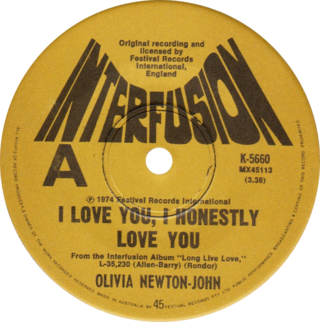
"I Honestly Love You" is a song recorded by Olivia Newton-John and released in 1974 on the album Long Live Love in the United Kingdom and If You Love Me, Let Me Know in the United States. The song became a worldwide pop hit, her first number-one single in the United States and Canada. The single was first released in Australia as "I Love You, I Honestly Love You", as per its chorus. The song was written by Jeff Barry and Australian singer and composer Peter Allen. The latter recorded it around the same time for his album Continental American.

"Physical" is a song recorded by British-Australian singer Olivia Newton-John for her 1981 eleventh studio album of the same name. It was released as the album's lead single on 28 September 1981. The song was produced by John Farrar and written by Steve Kipner and Terry Shaddick, who had originally intended to offer it to Rod Stewart. The song had also been offered to Tina Turner by her manager Roger Davies, but when Turner declined, Davies gave the song to Newton-John, another of his clients.

Physical is the eleventh studio album by British-Australian singer Olivia Newton-John, released through MCA Records on 13 October 1981. The album was produced and partly written by her long-time record producer John Farrar. Recorded and mixed at David J. Holman's studio in [[Los Angeles] additional recording atOcean Way, Physical became one of Newton-John's most controversial and sexual records, and her most successful studio album. Musically, the album features considerable use of synthesizers, and it explores lyrical themes such as love and relationships, sex, and environmental protection. Upon its release, while the album was a success it received mixed reviews from music critics the critics considered the album polarized and not as good as her previous albums but the album charted high in several countries, including the United States, Japan and Newton-John's native Australia, becoming one of the most successful albums of the early 1980s. It also ranks among the best-selling albums by Australian solo artists, selling more than ten million copies worldwide.
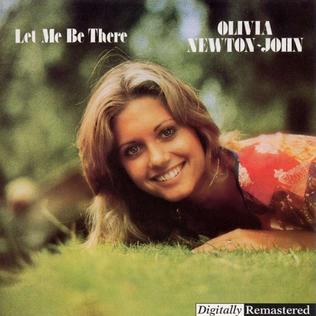
"Let Me Be There" is a popular song written by John Rostill. It was first recorded by Olivia Newton-John and released in September 1973 as the second single from her studio album of the same name. The country-influenced song was Newton-John's first Top 10 single in the US, peaking at No. 6, and also won her a Grammy Award for Best Female Country Vocalist. Mike Sammes sings a bass vocal harmony on the song.
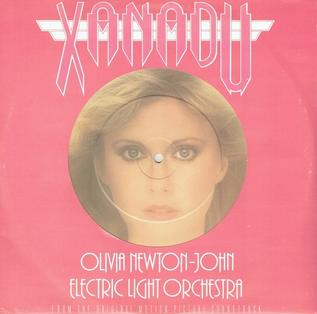
"Xanadu" is the title song from the soundtrack of the 1980 musical film of the same name. Written by Jeff Lynne of the English rock band Electric Light Orchestra (ELO), the song is performed by English-born Australian singer, songwriter and actress Olivia Newton-John, with Lynne adding parenthetic vocals in the style of his other songs on the Xanadu soundtrack, and ELO providing the instrumentation. It was Lynne's least favourite of his own songs. Released as a single in June 1980, it reached number one in several European countries and was the band's only UK number-one single when it peaked there for two weeks in July 1980. It was certified silver by the British Phonographic Industry. It also peaked at number eight on the US Billboard Hot 100.

"Waiting for a Girl Like You" is a 1981 power ballad by the British-American rock band Foreigner released as the second single from the album 4 (1981) and was co-written by Lou Gramm and Mick Jones. The opening motif was written by Ian McDonald and the distinctive synthesizer theme was performed by the then-little-known Thomas Dolby.
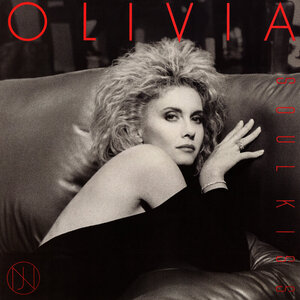
Soul Kiss is the twelfth studio album by English-Australian singer Olivia Newton-John, released on 25 October 1985 by Mercury Records in Europe, by Festival Records in Australia, and by MCA Records in the United States. It reached No. 11 on the Australian Kent Music Report Albums Chart and No. 29 on the United States Billboard 200. The album was produced by long-time associate John Farrar, who also co-wrote four tracks; the cover art features photography of Newton-John by Helmut Newton and Herb Ritts.

Olivia's Greatest Hits Vol. 2 is a greatest hits album by Olivia Newton-John released on 3 September 1982 in North America, Australasia, Scandinavia, South Africa and certain Asian and Latin American territories. It was her second greatest hits album released in North America and her third in other territories. The album compiled most singles released by Newton-John since the release of her 1977 Olivia Newton-John's Greatest Hits album from her following albums and soundtracks. The album included two new recordings; "Heart Attack" and "Tied Up", both of which were actually recorded during the sessions for the Physical album.

"Hopelessly Devoted to You" is a song recorded by British-Australian singer, songwriter and actress Olivia Newton-John for Grease: The Original Soundtrack from the Motion Picture (1978). It was written and produced by John Farrar and originally performed by Newton-John in the film version of the musical Grease (1978). The song was released in Australia in August 1978 and peaked at number two. It reached number three on the US Billboard Hot 100 and number seven on the Adult Contemporary chart. On the country chart, "Hopelessly Devoted to You" peaked at number 20 and was her first top 20 country hit in two years. Newton-John performed the song at the 21st Grammy Awards in 1979.
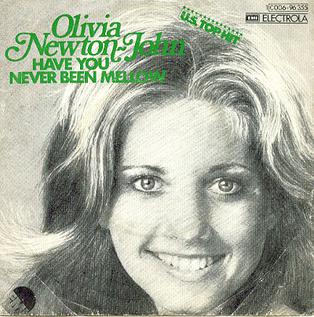
"Have You Never Been Mellow" is a song recorded by British-Australian singer Olivia Newton-John for her 1975 fifth studio album of the same name. Written and produced by John Farrar, the song was released as the lead single from the album in January 1975.
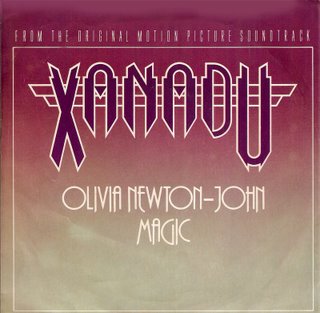
"Magic" is a song recorded by British-Australian singer Olivia Newton-John for the soundtrack to the 1980 musical fantasy film Xanadu, which starred Newton-John and Gene Kelly. Written and produced by Newton-John's frequent collaborator John Farrar, "Magic" was released as the soundtrack's lead single in May 1980 and topped the US Billboard Hot 100 for four weeks beginning on August 2. On August 30, it was displaced from the top by Christopher Cross's "Sailing".

The albums discography of British-Australian recording artist Olivia Newton-John consists of twenty-six studio albums, six live albums, fourteen compilations and six soundtracks. According to Billboard, Newton-John is the 44th most successful artist of all time. She is also listed as the 36th top female artist on the Billboard 200 all-time female list. To date, she has sold an estimated 100 million records worldwide, making her one of the world's best-selling artists of all time.
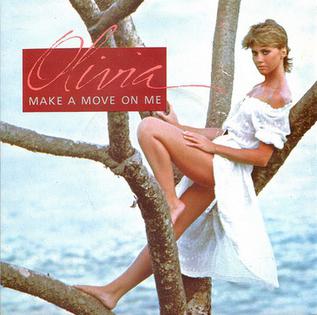
"Make a Move on Me" is a song recorded by singer Olivia Newton-John for her eleventh studio album. Physical (1981). It was written by John Farrar and Tom Snow, and produced by the former. The follow-up single to the number-one hit "Physical", it was released in January 1982 and peaked at number five on the US Billboard Hot 100 that April. It also became her twelfth and final single to be certified Gold by the Recording Industry Association of America (RIAA).

"A Little More Love" is a song recorded by British-Australian singer Olivia Newton-John for her tenth studio album, Totally Hot (1978). Written and produced by Newton-John's long-time record producer John Farrar, the song was released as the lead single from Totally Hot in October 1978 and became a worldwide hit single.
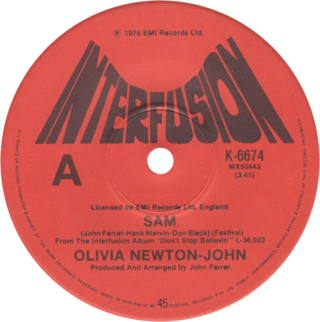
"Sam" is a song performed by Australian singer Olivia Newton-John. It was written by Don Black, Hank Marvin and John Farrar.

"If You Love Me (Let Me Know)" is a song written by John Rostill that was a 1974 hit single for Olivia Newton-John. It was her second release to hit the top 10 in the United States, reaching number 5 on the pop chart and number 2 on the Easy Listening chart. It also reached number 2 on the Billboard country chart. As with her single "Let Me Be There", Mike Sammes sings a bass harmony. It was nominated for the 1974 Country Music Association Award for Single of the Year.

"You Should Hear How She Talks About You" is a song that was first recorded by Charlie Dore for her 1981 Listen! album. "You Should Hear How She Talks About You" was written by Dean Pitchford and Tom Snow.

"Something Better to Do" is a song written by John Farrar and recorded by Olivia Newton-John. The song was released in September 1975 as the lead single from Newton-John's sixth studio album, Clearly Love. The narrator of the song muses that she's having a hard time adjusting to life without her departed lover; even the birds are wasting their songs singing to her, and until her beloved returns, "the birds will have to find something better to do."

Two of a Kind: Music from the Original Motion Picture Soundtrack is the soundtrack album of the film of the same name released in 1983 by MCA Records and features songs by the film's star Olivia Newton-John, as well as songs from various other artists.
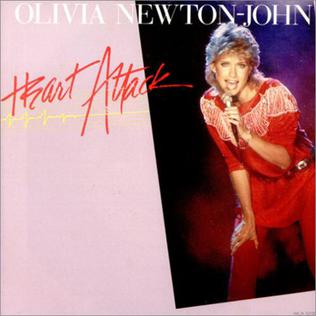
"Heart Attack" is a song recorded by English-born Australian singer Olivia Newton-John for her second greatest hits album Olivia's Greatest Hits Vol. 2 (1982). Written by Paul Bliss and Steve Kipner, and produced by John Farrar, the song was the first single released from the album and was nominated for a Grammy Award for Best Female Pop Vocal Performance in 1983.




















